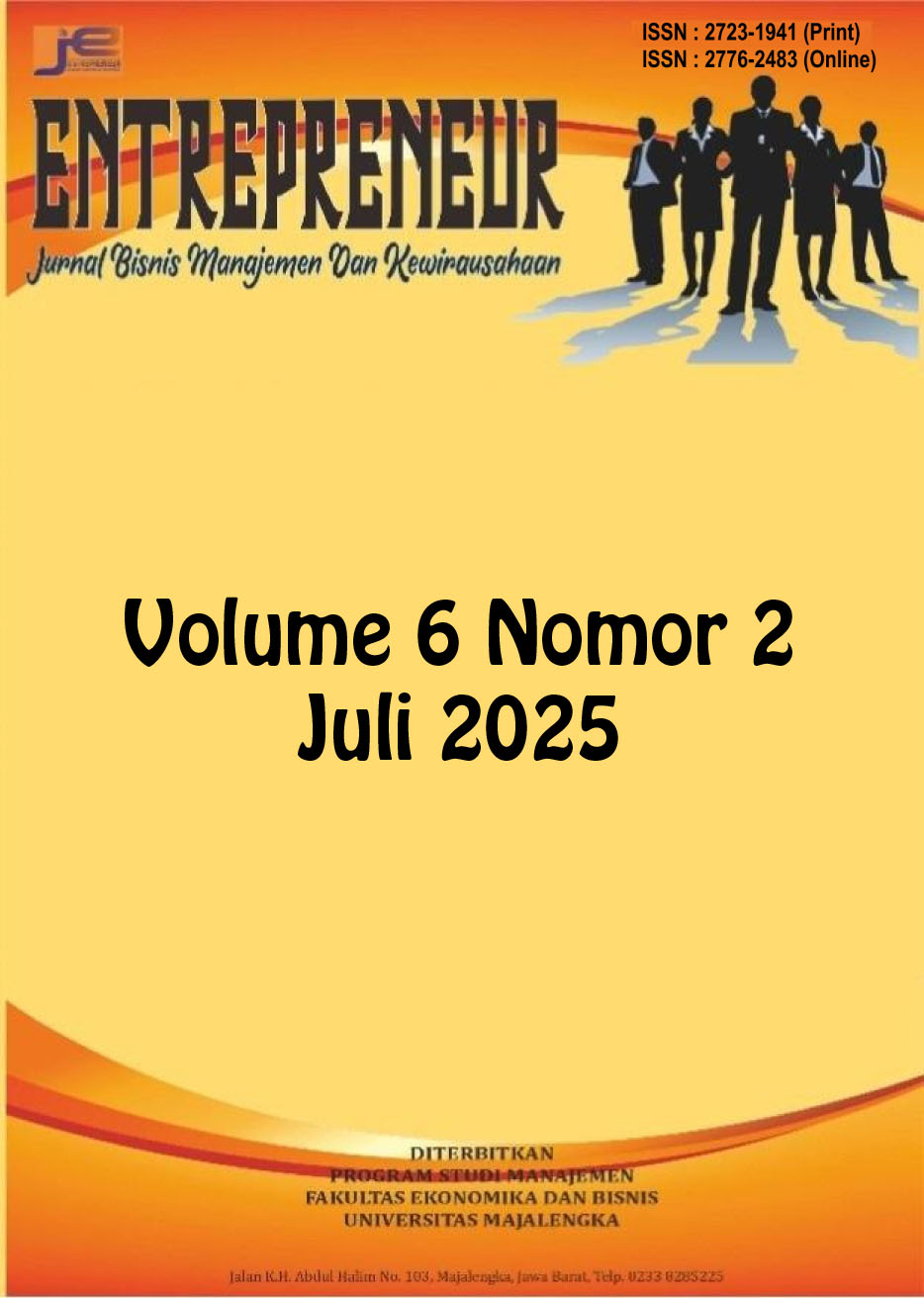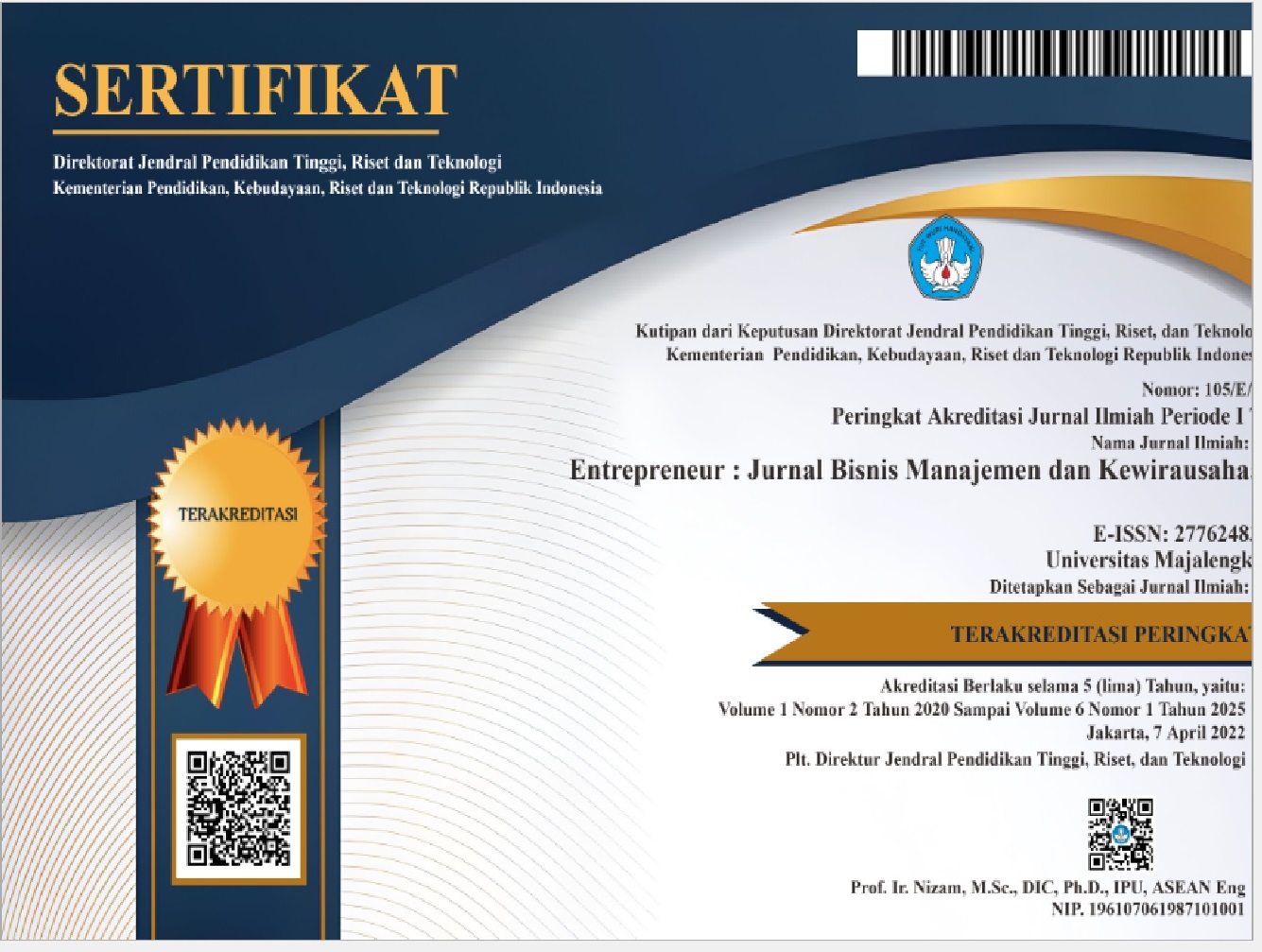Penerapan Model Digital Marketing Aida Dalam Pengembangan Media Sosial (Studi Kasus Umkm Desa Baturiti)
DOI:
https://doi.org/10.31949/entrepreneur.v6i2.13735Abstract
This research seeks to investigate how well the AIDA (Attention, Interest, Desire, Action) marketing framework performs in guiding social media strategies to boost brand visibility and revenue for Dapur Yura, a small to medium-sized enterprise (SME) located in Baturiti Village. The study utilized an experimental methodology, gathering both qualitative and quantitative data through observation, personal interviews, analysis of digital content insights, and practical testing. The findings reveal that applying a social media marketing tactic based on the AIDA framework significantly raised Dapur Yura's Return on Investment (ROI) from 50% to 118%. Additionally, the SME's social media metrics exhibited a remarkable enhancement in impressions, account reach, and user engagement when juxtaposed with prior to the advertisement rollout and also when compared to other similar SMEs that rely solely on organic content management. This study concludes that the AIDA framework serves as an effective tool for optimizing social media strategies for SMEs, resulting in improved brand recognition and increased sales.
Keywords:
AIDA Marketing Model, Digital Business, Digital Marketing, Small & Medium Enterprises, Social Media MarketingDownloads
References
UU No. 20 tahun 2008. Database Peraturan | JDIH BPK. (2008). https://peraturan.bpk.go.id/Details/39653/uu-no-20-tahun-2008
Jumlah UMKM Berdasarkan Bidang USAHA: Satu Data Indonesia provinsi bali. Jumlah UMKM Berdasarkan Bidang usaha | Satu Data Indonesia Provinsi Bali. (n.d.). https://balisatudata.baliprov.go.id/laporan/jumlah-umkm-berdasarkan-bidang-usaha?district_id=&sub_district_id=&year=2023&month=&date=
UMKM Indonesia. KADIN Indonesia. (2024, December 10). https://kadin.id/data-dan-statistik/umkm-indonesia/
Diansari, R. E., & Rahmantio, R. (2020). Faktor Keberhasilan Usaha Pada UMKM industri sandang dan kulit di Kecamatan Wirobrajan Kota Yogyakarta. Journal of Business and Information Systems (e-ISSN: 2685-2543), 2(1), 55–62. https://doi.org/10.36067/jbis.v2i1.60
Social, W. A. (2025, February 4). Digital 2024. We Are Social Indonesia. https://wearesocial.com/id/blog/2024/01/digital-2024/
Fortenberry, J. L., JR., & McGoldrick, P. J. (2019). Do Billboard Advertisements Drive Customer Retention? Expanding the “AIDA” Model to “AIDAR.” Journal of Advertising Research, 60(2), 135–147. https://doi.org/10.2501/JAR-2019-003
Evania, B. E., Kastaman, R., & Pujianto, T. (2021). Penggunaan Media Sosial Dengan Pendekatan Model Aida Bagi Roti Bund Dalam Meningkatkan Minat Beli Konsumen. Jurnal Bisnis Dan Kajian Strategi Manajemen, 5(2).
Djubair, R. A., Ming, W. W. P., & School of Business and Management, University of Technology Sarawak, Malaysia. (2022). Relationship of AIDA Model towards Data Analytics Capabilities, Marketing Strategies and Digital Marketing Performance on Small and Medium Enterprises (SMEs). International Journal of Social Science and Education Research Studies, 2(10), 559-64.
Veleva, S. S., & Tsvetanova, A. I. (2020, September). Characteristics of the digital marketing advantages and disadvantages. In IOP Conference Series: Materials Science and Engineering (Vol. 940, No. 1, p. 012065). IOP Publishing.
Puspaningrum, A. (2020). Social media marketing and brand loyalty: The role of brand trust. The Journal of Asian Finance, Economics and Business, 7(12), 951-958.
Rachmad, Y. E. (2022). Social Media Marketing Mediated Changes In Consumer Behavior From E-Commerce To Social Commerce. International Journal of Economics and Management Research, 1 (3), 227, 242.
Banerjee, M. (2022). Is AIDA effective tool in measuring advertising/marketing campaigns? A literature review. A Literature Review (October 29, 2022).

Published
How to Cite
Issue
Section
License
Copyright (c) 2025 Sudana Putra, Ngurah Gede Dwi Mahadipta, Muhammad Febrian Rachmadhan Amri, Putu Yogi Agustia Pratama, Zulfikar Sa’ban

This work is licensed under a Creative Commons Attribution-ShareAlike 4.0 International License.
COPYRIGHT NOTICE
An author who publishes in the Entrepreneur: Jurnal Bisnis Manajemen dan Kewirausahaan agrees to the following terms:
1. Author retains the copyright and grants the journal the right of first publication of the work simultaneously licensed under the Creative Commons Attribution-ShareAlike 4.0 License that allows others to share the work with an acknowledgment of the work's authorship and initial publication in this journal
2. The author is able to enter into separate, additional contractual arrangements for the non-exclusive distribution of the journal's published version of the work (e.g., post it to an institutional repository or publish it in a book) with the acknowledgment of its initial publication in this journal.
3. The author is permitted and encouraged to post his/her work online (e.g., in institutional repositories or on their website) prior to and during the submission process, as it can lead to productive exchanges, as well as earlier and greater citation of the published work







